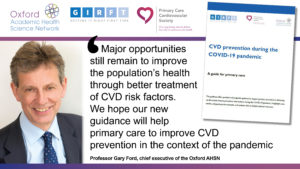 A new practical guide has been produced to help primary care teams across England overcome limitations created by Covid-19 and continue to deliver quality cardiovascular disease (CVD) prevention services.
A new practical guide has been produced to help primary care teams across England overcome limitations created by Covid-19 and continue to deliver quality cardiovascular disease (CVD) prevention services.
Since the arrival of the pandemic, patients are likely to have had less contact with healthcare professionals, leading to lower detection rates for CVD risk factors such as hypertension and atrial fibrillation. Symptoms of stroke, TIA or heart attack may also have gone unreported. At the same time, primary care teams have had to rapidly shift to remote working.
The new guidance – produced in a collaboration between the Oxford Academic Health Science Network (Oxford AHSN) and the Getting It Right First Time (GIRFT) programme – is co-authored with the Primary Care Cardiovascular Society (PCCS) and aims to signpost primary care professionals to the right resources to address these and related issues. It has been put together by a wide-ranging team of national experts and includes experience from the NHS primary care frontline.
The key information for primary care CVD prevention teams includes:
- Failing to address CVD risk factors during the Covid-19 pandemic risks additional and preventable cardiovascular events
- Taking a holistic approach to CVD prevention – do not treat CVD risk factors in isolation
- Making the most of all contacts with patients, especially face-to-face
- Using the skills of the extended primary and community care team
- Making the most of any opportunities to assess the CVD risk of your population
- Offering lifestyle advice to all, using searches and risk stratification tools to identify those most at risk
- Ensuring patients are on the best medication for them, including the optimal dose
- Promoting self-monitoring using digital technology, but ensuring non-digital ways of accessing care are still available.
CVD prevention during the Covid-19 pandemic: a guide for primary care has been published on the PCCS website. Further guidance will follow focusing on wider health systems.
Dr Jim Moore, GP and president of the PCCS, said: “It is essential that we in primary care continue to address the risk factors related to cardiovascular disease to minimise the otherwise inevitable consequences during and beyond the pandemic. Supporting primary care in delivering high quality healthcare to prevent cardiovascular disease is a key role of the PCCS and this document, provides timely and comprehensive guidance as to how we might achieve this during this difficult time.”
Dr David Hargroves, national GIRFT lead for stroke and a consultant stroke physician at East Kent Hospitals University NHS Foundation Trust, said: “Inevitably there has been variation in the way teams are delivering their CVD prevention work in the context of the pandemic, but it is important that we all act now to ensure that we learn from best practice so that patients are getting the most from their contacts with healthcare professionals, whether that is face-to-face or virtual. This guide aims to help anyone working in primary care find the resources they need to identify CVD risk factors and take the appropriate action to treat them.”
Professor Gary Ford, Chief Executive of the Oxford AHSN, said: “Cardiovascular disease is a major driver of health inequalities – and effective treatment has been one of the major drivers of health improvement in recent decades. Major opportunities still remain to improve the population’s health through better treatment of CVD risk factors. We hope our new guidance will help primary care to improve CVD prevention in the context of the pandemic.”
The CVD prevention guidance follows similar guides produced earlier in the pandemic by the Oxford AHSN and GIRFT, which focused on stroke services and were supported by the British Association of Stroke Physicians (BASP).

